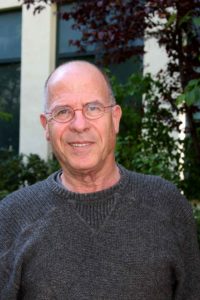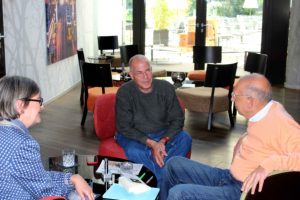“I am doing what Jewish people have done throughout their history – I tell stories“, says Israeli best-selling author Meir Shalev. In our exclusive interview, Shalev talks about his being in love with love, about his family’s tradition of storytelling and his favourite book. He explains why art should never be moralistic and why he will not turn the other cheek to the mole in his garden…
You are an expert in matters of love. Is the German-Israeli relationship a love affair?
I have many readers in Germany and I feel great sympathy for them. I first travelled to Germany after my first novel Roman Russi was translated [1993, in English The Blue Mountain]. It was not an easy visit. I do not come from a family of Holocaust survivors, most of my family came to Palestine during the Second Aliyah [before WWI]. I remember people asking me at readings how I felt having my books translated into German. I said then and I say now: This is my way to tell the German people that I am alive. And that I am doing what Jewish people have done throughout their history – I tell stories …
Israel is full of stories … in a bus or a cab, the driver will tell you the story that his family came from Baghdad … but that a grandmother came from Vitebsk … Your father was also a writer…
My father was a well-known poet, very popular in the 1950s and 1960s. He wrote three novels, two are forgotten. But one, The Gabriel Tirosh Affair of 1964, is still being printed and sold. It is a very political book. My father was a strong right-winger. He would fight for human rights for everybody but, long before 1967, he preached we have to liberate the territories. Take Jerusalem, take the cave of the Patriarchs, he said, even though he was a secular person. My mother, on the other hand, came from a socialist family. My parents’ marriage was a big thing in Israel when it happened: She was from the moshav, he was from the city, she was from the left, he was from the right. But our differences in politics only started after the Six Day War. Before, the whole idea of left and right was theoretical …
What drives you to write?
I started writing late. My first novel was published when I was 40. Before, I had written two childrens’ books. I had started making up stories for my two kids and one evening, my wife heard me telling them a story and she said: It’s a good story, why don’t you write it down. Then I wrote a collection of essays about the Bible – very political and literary and not religious at all. I was working for Israeli TV, had my own talk show. I was quite successful but I felt more and more disappointed in what I was doing. I knew I could teach, but I did not have enough patience to become a good teacher. And as for science, it is rather difficult to start a scientific career at the age of 40 … So I decided to take a year off and try to write a novel. This is when I composed Roman Russi which is based on some of my family’s stories and the atmosphere in my family. I found out: I can write and, I can write a book. It was a big surprise. I always knew I could put words one next to another and one sentence next to another but I found it quite difficult to create a structure which a novel also needs. With a book, you have to be an engineer, not only an architect …
Your characters often have special gifts and talents, they can see more, have a better sense of smell, can anticipate events … a supernatural touch?
Some say Roman Russi is magic realism – a terminology I do not accept at all. Quite simply, the narrator in the book is a naive boy who believes the stories told to him by his grandparents, by his uncles – as I did. All my mother’s family were great storytellers. They told beautiful stories about their donkey which could fly and about a man who was riding rabbits at night.
You are a keen observer of nature – in Fontanelle, the twins look at each other with the mischievous grin of cuckoos’ chicks who have been placed in the wrong nest …
I love nature and use it a lot in my books, both as a stage and also as a metaphor. I am, by the way, the only author in Israel and perhaps in the world who received a prize from the Israeli Entomological Society for describing insects in Roman Russi … And the Department of Zoology at Tel Aviv University gave me a literary prize for describing animals. Nature is always present in my novels, but in my new book, Ginat ha-bar, The Wild Garden, it is the main character, the real hero.
The role of love? In your books, love is not always connected to eroticism …
Yes. I write about erotic love, but in my private life as well as in my books I am in love with love itself. I am not only in love with a woman, but with love itself. That can make life difficult sometimes …
Is one motive for writing books the need to feel loved by your readers?
This is a completely different thing. This is not the kind of love I am writing about. Everybody knows what love is. It may be difficult to put into words but we know what love is when we have it and we know what it is when we don’t have it. When God tells Abraham to take his son, He says: Ahavta – in the past tense “the one you loved.” This is the first time the word love appears in the Bible – it is not the love between a man and a woman but the love of a father for his son. I think it is in the past tense because God wanted to tell Abraham: the feeling you have for this boy, this feeling you know from the past, the feeling you had and you have for this boy from now on, is called love. It is the first time the word is used in Hebrew.
Can writers improve the world?
It is not my objective, and I don’t want to take on this role. I do not feel I have a social or moral mission. My book Shtaim Dubim/Two She Bears was criticized by some as being immoral. There is a murderer in the book who goes unpunished, moreover, the man who takes revenge is mentally healed by killing other people. I don’t think literature or any art should be moralistic or anti-moralistic – it can present a moralistic situation and ask the reader to think about it. When I wrote the book, I was thinking what I would have done if I were in the shoes of my characters. Would I take revenge like that? Honestly, I don’t see myself murdering the lover of my wife …
… but you invented the story – so it is in you –
It is in me as a writer, not in me as a person. But the thing that is in me as a person is the blood revenge which is in the book when Eitan kills the criminals who killed Zeev, the grandfather. This Biblical nekamat dam, killing someone who killed a member of your family, is in me, though I would not do it because I am afraid of the law …
… not like the good Christian who turns the other cheek …
No. In my book about my garden I tell of the war I waged against the mole eating my plants – I hate moles, I am not a pacifist, I will not turn my other cheek to this mole …
Any plans for a new book?
Currently, I am writing a novel, again a love story. Part of it will be set in Europe …
… perhaps in Germany …
Maybe. I don’t know yet. It is about a man who is following his love. Most of it will take place in Jerusalem and the Galilee, and part of it in Europe. Some of my book Esav takes place in the United States… Usually, writers don’t tell you such things, but Esav is my favorite amongst my novels. I simply love Esav more than the others.
Meir Shalev talked to JVG editors Elisabeth Neu and Rafael Seligmann in Berlin



